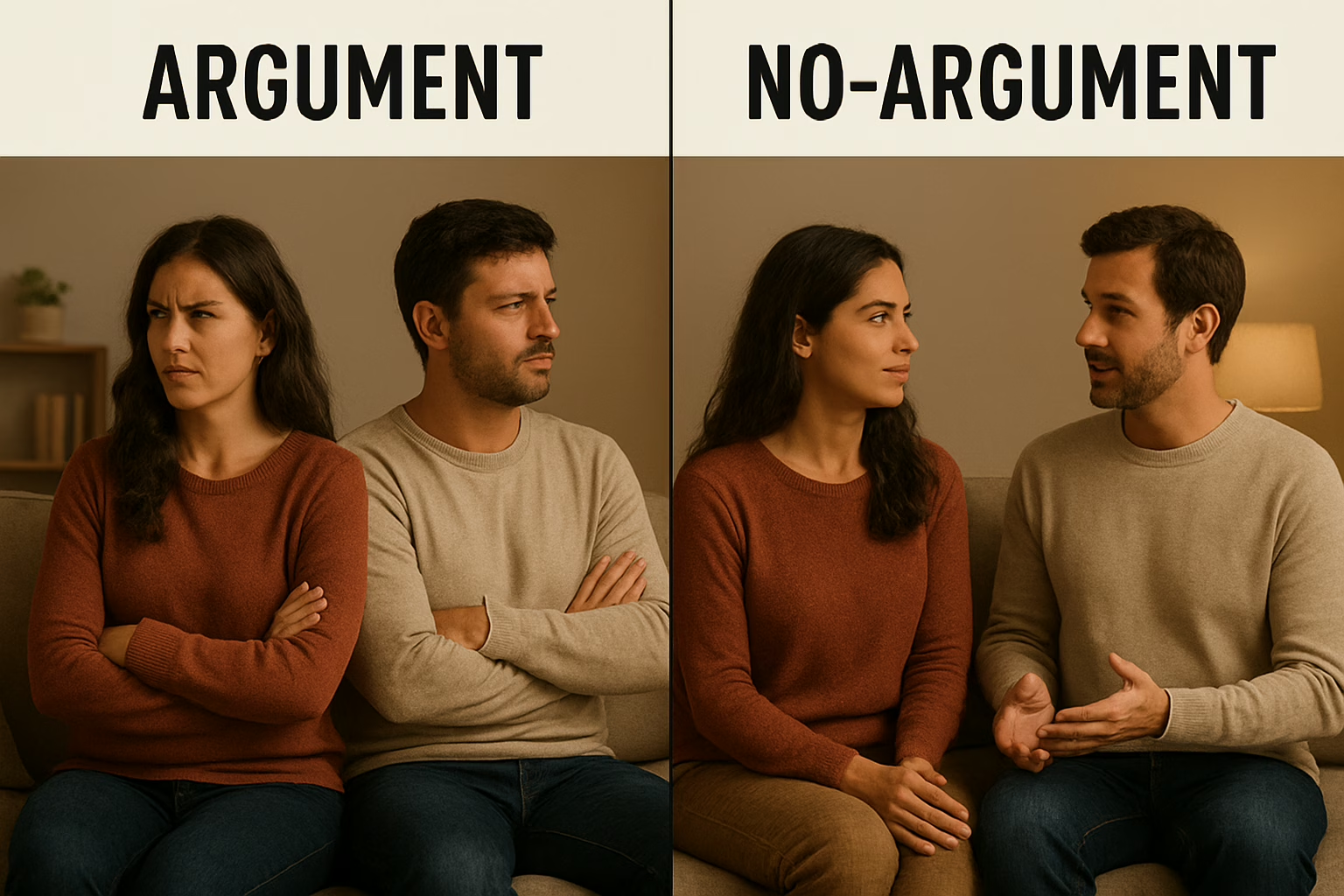
What if you could transform your relationship in just seven days? Not through grand gestures or expensive therapy, but by doing something counterintuitive: agreeing not to argue for an entire week. This isn’t about suppressing feelings or avoiding important conversations—it’s about discovering new ways to navigate disagreements that strengthen rather than strain your bond.
The No-Argument Week experiment has helped thousands of couples break destructive communication patterns and develop healthier approaches to conflict resolution. By temporarily removing the option to argue, couples discover alternative communication strategies that often prove far more effective than their old patterns.
Understanding the No-Argument Week Concept
The No-Argument Week isn’t about becoming passive or avoiding all disagreements. Instead, it’s a structured experiment that challenges couples to find new ways to express concerns, address issues, and work through differences without falling into argument patterns.
What This IS:
- A communication experiment focused on alternative conflict resolution
- An opportunity to practice new dialogue techniques
- A way to break negative interaction cycles
- A method for discovering what triggers arguments in your relationship
What This ISN’T:
- Suppressing important feelings or concerns
- Avoiding necessary conversations about relationship issues
- Pretending problems don’t exist
- One partner silencing the other

The Science Behind Conflict-Free Communication
Research from relationship experts like Dr. John Gottman reveals that it’s not the presence of conflict that predicts relationship failure, but how couples handle disagreements. The No-Argument Week leverages several psychological principles:
Neuroplasticity and Habit Formation
When couples repeatedly engage in arguments, they create neural pathways that make argumentative responses automatic. The No-Argument Week interrupts these patterns, forcing the brain to create new pathways for conflict resolution.
The Pause Principle
Arguments often escalate because partners react immediately to triggers. This experiment builds in natural pauses that allow for more thoughtful responses rather than reactive ones.
Positive Psychology Application
By removing the negative interaction pattern of arguing, couples naturally increase their ratio of positive to negative interactions—a key predictor of relationship success.
Day-by-Day Guide to Your No-Argument Week
Day 1: Setting Ground Rules and Intentions
Objective: Establish clear boundaries and commit to the experiment together
Activities:
- Discuss what constitutes an “argument” vs. healthy discussion
- Agree on alternative phrases to use when disagreements arise
- Create a signal system for when one partner feels an argument brewing
Alternative Phrases to Practice:
- Instead of “You’re wrong”: “I see it differently, can we explore both perspectives?”
- Instead of “You always/never”: “I’ve noticed a pattern, can we talk about it?”
- Instead of “That’s ridiculous”: “Help me understand your viewpoint”

Day 2: The Power of “I” Statements
Objective: Transform complaints into personal expression
When disagreements arise, focus entirely on “I” statements rather than “You” accusations. This fundamental shift changes the entire dynamic of potential conflicts.
Practice Exercises:
- “I feel overwhelmed when…” instead of “You make me crazy when…”
- “I need help with…” instead of “You never help with…”
- “I’m concerned about…” instead of “You’re doing this wrong…”
Real-World Application: If your partner leaves dishes in the sink, instead of arguing about their laziness, express your own needs: “I feel more relaxed in a clean kitchen. Could we work out a system that works for both of us?”
Day 3: Active Listening Without Rebuttal
Objective: Develop the skill of truly hearing your partner without immediately formulating counterarguments
The 24-Hour Rule: When your partner expresses a concern or viewpoint you disagree with, commit to listening fully and waiting 24 hours before responding. This prevents reactive arguments and allows for thoughtful consideration.
Listening Techniques:
- Maintain eye contact and open body language
- Repeat back what you heard to ensure understanding
- Ask clarifying questions before forming responses
- Express appreciation for your partner’s willingness to share

Day 4: Finding Common Ground First
Objective: Start difficult conversations by identifying shared values and goals
Before addressing any disagreement, spend time identifying what you both want to achieve. Most relationship conflicts stem from shared underlying desires expressed in different ways.
Common Ground Technique:
- Identify the underlying need or value behind each position
- Find the shared goal you both want to achieve
- Brainstorm solutions that honor both perspectives
- Choose an approach to try together
Example: If one partner wants to save money while the other wants to enjoy life, the common ground might be “financial security and happiness.” Solutions can honor both values.
Day 5: The Art of Compromise Without Resentment
Objective: Learn to find middle ground that genuinely works for both partners
True compromise isn’t about one person giving up what they want—it’s about creating solutions that incorporate both partners’ core needs.
Compromise Framework:
- Each partner identifies their non-negotiables
- Find areas where you can be flexible
- Create solutions that protect both partners’ essential needs
- Build in review periods to adjust agreements as needed

Day 6: Addressing Underlying Issues
Objective: Move beyond surface-level disagreements to understand root causes
Many arguments are symptoms of deeper unmet needs or unresolved issues. Day 6 focuses on identifying and addressing these underlying concerns without falling into argument patterns.
Root Cause Analysis:
- What need is each partner trying to meet through their position?
- What fears or insecurities might be driving the disagreement?
- Are there past experiences influencing current reactions?
- What would help each partner feel more secure or valued?
Gentle Exploration Techniques:
- “What would help you feel more supported in this situation?”
- “Are there past experiences that make this particularly important to you?”
- “What would an ideal solution look like from your perspective?”
Day 7: Creating New Communication Patterns
Objective: Establish sustainable practices for ongoing conflict management
The final day focuses on integrating the week’s lessons into permanent relationship patterns.
New Communication Agreements:
- Weekly check-ins to address issues before they escalate
- Agreed-upon signals for when discussions are becoming too heated
- Commitment to 24-hour cooling-off periods when needed
- Regular appreciation and gratitude expressions

Advanced Couple Conflict Tips for Long-Term Success
The Time-Out Strategy
When emotions run high, either partner can call a respectful time-out. This isn’t about winning or losing—it’s about preventing damage to the relationship while emotions are too intense for productive discussion.
Effective Time-Out Protocol:
- Use a predetermined phrase: “I need some time to think about this”
- Specify when you’ll return to the conversation: “Let’s talk about this tonight after dinner”
- Use the time for self-reflection, not building your case
- Return as promised with a calmer mindset
The Repair Attempt
Dr. Gottman’s research shows that successful couples make “repair attempts”—efforts to de-escalate tension and reconnect during difficult moments.
Repair Attempt Examples:
- “I’m feeling overwhelmed. Can we slow down?”
- “I love you and want to work this out together”
- “Let me try saying that differently”
- “Can we take a hug break?”
Building Emotional Bank Accounts
Stephen Covey’s concept of emotional bank accounts applies powerfully to relationships. Every positive interaction makes a deposit, while conflicts make withdrawals. The No-Argument Week helps couples build substantial positive balances.
Daily Deposits:
- Express genuine appreciation
- Show physical affection
- Listen without trying to fix or change
- Support your partner’s individual goals
- Share positive experiences together

Common Challenges and Solutions
“But Important Issues Aren’t Getting Addressed”
The No-Argument Week doesn’t mean avoiding important conversations. It means having them differently. Many couples discover they can address serious issues more effectively without argument patterns.
Solution: Schedule specific times for important discussions. Use the techniques you’re learning to explore issues without escalating into arguments.
“My Partner Isn’t Really Participating”
Sometimes one partner is more committed to the experiment than the other. Don’t let this derail your efforts.
Solution: Model the behavior you want to see. Often, when one partner consistently responds non-argumentatively, the other naturally begins to mirror this approach.
“We’re Just Bottling Everything Up”
If the week feels like emotional suppression, you’re not implementing the experiment correctly.
Solution: The goal is expression without argumentation. Continue sharing feelings and concerns—just do it through the new techniques you’re learning.
“Everything Feels Artificial”
New communication patterns often feel unnatural at first, like learning any new skill.
Solution: Give yourself time to adjust. Most couples report that the new patterns begin feeling natural by day 4 or 5.

The Neuroscience of Changing Argument Patterns
Understanding the brain science behind arguments can help couples appreciate why the No-Argument Week is so effective.
The Amygdala Hijack
When we perceive threat (even in arguments), the amygdala triggers fight-or-flight responses. This makes rational discussion nearly impossible. The No-Argument Week trains couples to recognize these triggers and respond differently.
Creating New Neural Pathways
Every time couples choose a non-argumentative response over an argumentative one, they strengthen new neural pathways. Within a week, these new patterns become significantly easier to access.
The Positivity Ratio
Research shows that successful relationships maintain at least a 5:1 ratio of positive to negative interactions. Arguments often skew this ratio negatively. The No-Argument Week helps restore positive balance.
Long-Term Benefits of Conflict-Free Communication
Improved Emotional Intimacy
When couples feel safe from verbal attacks, they’re more willing to be vulnerable and share deeper feelings.
Better Problem-Solving
Without the emotional charge of arguments, couples can focus on creative solutions rather than winning or being right.
Modeling for Children
Children learn relationship patterns from their parents. Conflict-free communication creates positive models for their future relationships.
Reduced Stress and Improved Health
Chronic arguing creates stress that impacts physical health. Peaceful conflict resolution benefits both emotional and physical well-being.
Enhanced Relationship Satisfaction
Couples who master non-argumentative communication report significantly higher relationship satisfaction and longevity.
Beyond the Week: Maintaining Your Progress
Monthly Relationship Meetings
Schedule regular check-ins to address issues before they escalate. Use the communication skills you’ve developed to maintain ongoing connection.
Continuing Education
Read books, attend workshops, or see a counselor together to continue developing your communication skills.
The Annual No-Argument Week
Consider making this an annual tradition, using it as a relationship tune-up to reinforce healthy communication patterns.
Building Support Networks
Connect with other couples who prioritize healthy communication. Having a support network makes it easier to maintain positive patterns.
Conclusion: Your Relationship Revolution Starts Now
The No-Argument Week isn’t just about avoiding conflicts—it’s about revolutionizing how you and your partner navigate differences. By removing the option to argue, you’re forced to develop more sophisticated, effective communication skills that will serve your relationship for years to come.
Every successful relationship requires ongoing effort and growth. The couples who thrive are those who continuously seek better ways to understand, support, and connect with each other. This week-long experiment is your opportunity to break free from destructive patterns and create the kind of relationship you both deserve.
Remember, the goal isn’t perfection—it’s progress. Even if you don’t make it through the entire week without a single argument, the awareness and skills you develop will benefit your relationship immensely. Many couples report that even attempting the No-Argument Week transforms their communication permanently.
Start tonight. Sit down with your partner, explain the concept, and commit to seven days of exploring new ways to handle disagreements. Your relationship—and your future together—will be stronger because of it.
The most beautiful relationships aren’t those without conflict—they’re those where partners have learned to navigate differences with love, respect, and skill. The No-Argument Week is your pathway to becoming that kind of couple.
